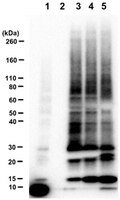Proteasome-mediated processing of Def1, a critical step in the cellular response to transcription stress.
Wilson, MD; Harreman, M; Taschner, M; Reid, J; Walker, J; Erdjument-Bromage, H; Tempst, P; Svejstrup, JQ
Cell
154
983-95
2013
요약 표시
DNA damage triggers polyubiquitylation and degradation of the largest subunit of RNA polymerase II (RNAPII), a "mechanism of last resort" employed during transcription stress. In yeast, this process is dependent on Def1 through a previously unresolved mechanism. Here, we report that Def1 becomes activated through ubiquitylation- and proteasome-dependent processing. Def1 processing results in the removal of a domain promoting cytoplasmic localization, resulting in nuclear accumulation of the clipped protein. Nuclear Def1 then binds RNAPII, utilizing a ubiquitin-binding domain to recruit the Elongin-Cullin E3 ligase complex via a ubiquitin-homology domain in the Ela1 protein. This facilitates polyubiquitylation of Rpb1, triggering its proteasome-mediated degradation. Together, these results outline the multistep mechanism of Rpb1 polyubiquitylation triggered by transcription stress and uncover the key role played by Def1 as a facilitator of Elongin-Cullin ubiquitin ligase function. | 23993092
 |
MultiDsk: a ubiquitin-specific affinity resin.
Wilson, MD; Saponaro, M; Leidl, MA; Svejstrup, JQ
PloS one
7
e46398
2012
요약 표시
Ubiquitylation is a highly diverse and complex post-translational modification for the regulation of protein function and stability. Studies of ubiquitylation have, however, been hampered by its rapid reversal in cell extracts, for example through the action of de-ubiquitylating enzymes (DUBs). Here we describe a novel ubiquitin-binding protein reagent, MultiDsk, composed of an array of five UBA domains from the yeast ubiquitin-binding protein Dsk2, fused to GST. MultiDsk binds ubiquitylated substrates with unprecedented avidity, and can be used as both an affinity resin to study protein ubiquitylation, and to effectively protect ubiquitylated proteins from the action of DUBs and the proteasome in crude cell extracts. We use the resin to show that the Def1 protein becomes ubiquitylated in response to DNA damage, and to isolate ubiquitylated forms of RNA polymerase II. | 23056298
 |












